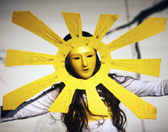FORGET the headlines and the sound bites – what do young Palestinian refugees really want to say?
Children from Shatila, a Palestinian Refugee Camp in Beirut, will perform Peter Mortimer’s fable, Croak, the King and a Change in the Weather, on Wednesday 6 April in Edinburgh.
Croak, the King and a Change in the Weather tells the story of how a cruel and dictatorial monarch is brought down by the forces of nature using live music, dance and mime.
Having already performed in Gateshead’s The Sage and then set for Liverpool on the 8 April this is an experience quite different to the usual confines of their squalid refugee camp. Investment from Creative Scotland has now helped bring the young performers to Scotland all of whom have never left the camp before.
Emma Turnbull, development officer for Creative Scotland said: “The Shatila project is an exciting and important piece of work. The performance of ‘Croak, the King and a change in the weather’ will offer performers and audiences a rare opportunity to look at complex universal issues through the medium of a modern fable. It is a refreshing and energetic project which embodies the spirit of hope, change and second chances.”
With a constant wave of change echoing out from the younger generations, it seems a passionate allegory gives voice to their optimism for the future of their plight and the Storytelling Centre is proud to host the event as
Donald Smith, director of the Scottish Storytelling Centre, explains:
“We talk a good game in Scotland about creativity releasing and empowering, but these Palestinian youngsters have never been abroad and rarely outside Shatila Refugee Camp.
“Aided by Newcastle-based writer and director, Peter Mortimer, the youngsters make an age-old Palestinian tradition, now deracinated, their own, and bring it to life for us as part of Ceilidh Culture.
“The Storytelling Centre is a place you can make connections, between story, song, music and drama; between cultures; between generations, and across barricades. Storytelling is a grassroots art and taps into the sources of common humanity. There is political edge in this visit, as Palestine remains a besieged and partitioned country. But sometimes amidst ideological discord the notes of humanity are more clearly heard through art. Surely the young of every culture deserve their chance.
“In late 2009, after a year of dedicated fund-raising in the UK, the original cast of Palestinian youngsters travelled to North-east England and gave eight performances of the play to large and appreciative audiences.
“Spurred on by this success, in February 2011, with a new cast of Shatila children and the support of a choreographer, stage manager and musicians, Peter staged a full week at Theatre Monot in the mainly Christian East Beirut. For Palestinian young people to perform in a professional theatre in East Beirut is a landmark of some significance.”
And the significance in their approach to the piece speaks volumes, as explained by Frances Guy, Ambassador to the Republic of Lebanon, Beirut: “In the original version of the play, the tyrant and his assistant pay the ultimate price for their abuse of power.
“But the Shatila kids asked Peter to change the ending to give the King a second chance.
“To preserve that sense of humanity and forgiveness beyond the planks of the theatre is pertinent to our times. But beyond that, the performance of these enthusiastic kids from a Palestinian camp that in its history has seen the worst of atrocities is exhilarating.
“These kids, whose daily life is a battle against overcrowding, damp, fallen electricity wires, lack of income and long term medical problems, show us a humanity that many in the Middle East and beyond are lacking.”
Children, in themselves symbols of resilience and optimism, should not have to chase after sanguinity. Neither should they have to trust in it blindly. The play accumulates a multiplicity of significance because it is performed by children and because of their enjoyment in what they have invested in it.
Described as a “fable on how the mighty are undone,” it’s even more a plea, an exemplar and a rebuke. It calls for change, though it never once asks for it categorically.
“Comic, striking and significant, Croak is absolutely worth a watch.” Lebanon Daily Star
ENDS
For further information, images or to arrange interviews contact:
Lindsay Corr lindsay@scottishstorytellingcentre.com or 0131 652 3272
Notes to editors:
Ticket Information: Wed 6 April, 3pm & 7pm (40mins), £5/£3.50, 8+
Box Office: 0131 556 9579 | www.scottishstorytellingcentre.co.uk
- The Scottish Storytelling Centre is the national body for the support and development of the storytelling artform. The organisation is a partnership between the Scottish Storytelling Forum and the Church of Scotland, and is supported by Creative Scotland, the City of Edinburgh Council and a wide range of charitable donations. www.scottishstorytellingcentre.co.uk
- Creative Scotland is the national leader for Scotland’s arts, screen and creative industries. Established in July 2010, Creative Scotland is a non-departmental public body (NDPB) and is a significant investor in the creative sector, committing both Scottish Government and National Lottery funding. It is committed to working with partners across local government and the wider public sector, creative people and organisations, as well as commercial partners. Creative Scotland will: Invest in talent; Invest in quality of artistic production; Invest in audiences, access and participation; Invest in the cultural economy; Invest in places and their contribution to a Creative Scotland. Education, equalities and international partnerships underpin all of our work. Creative Scotland has replaced both Scottish Screen and the Scottish Arts Council. www.creativescotland.com
MEDIA RELEASE posted by the Church of Scotland. You too can post media releases (aka press releases) on allmediascotland.com. For more information, email here.
Contact: Lindsay Corr
Phone: 0131 556 9579
Email: lindsay@scottishstorytellingcentre.com
Website: http://www.scottishstorytellingcentre.co.uk






